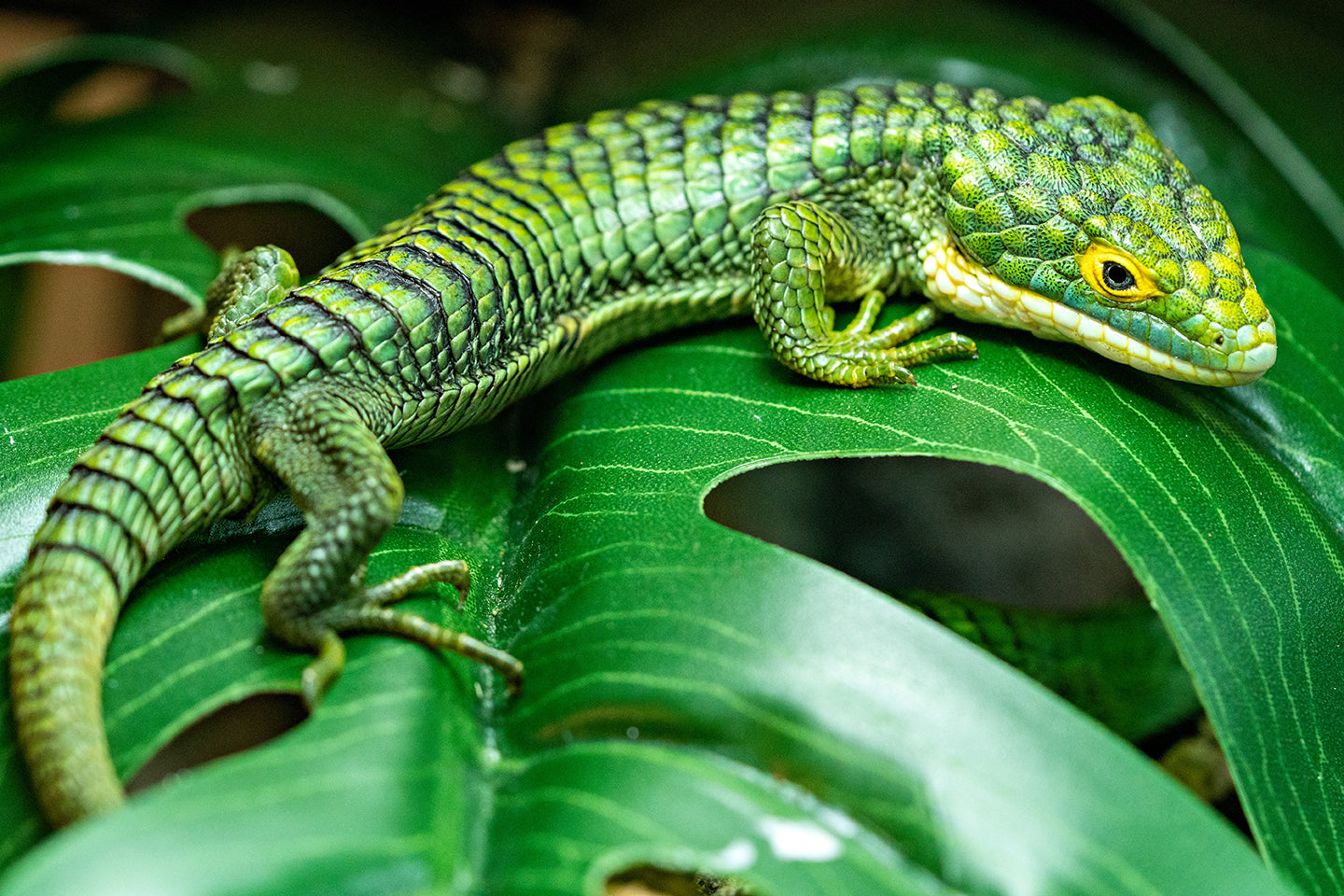Are you looking for a fur-free, training-free pet that's also gorgeous to look at? Then a lizard might be the perfect pet for you! One of the most unique lizards is the Mexican alligator lizard, and with the right care, it could be the ideal companion for you.
The Mexican alligator lizard is a beautiful, 6-inch-long lizard. They are native to the beautiful cloud forests found in Honduras, Guatemala, and of course, Mexico.
Though they are quite rare and require very particular care, Mexican alligator lizards can make for gorgeous and unique pets. Read this guide to find out everything you need to know about this gorgeous reptile.
What Does a Mexican Alligator Lizard Look Like?
Mexican alligator lizards come from generally montane forested regions. Because of the variety in their habitats, they come in a broad spectrum of different patterns and colors.
However, all Mexican alligator lizards have a few features in common. These include:
- Rows of wide, thick scales
- Long toes
- Elongated bodies
- Large, triangle-shaped heads
- Thin, prehensile tails
- Yellow markings around their eyes
Male lizards are typically more brightly colored than their female counterparts. They are around 6-12 inches in length, with their tails making up about half of this length.
What Do Mexican Alligator Lizards Act Like?
Though they are generally very docile creatures, alligator lizards do have a tendency to be quite territorial. They may also become agitated when stressed and have been known to bite when provoked.
Abronia lizards tend to live around 10 years in the wild. However, they can live as long as 20 years in captivity so long as their living conditions are ideal.
What is the Ideal Environment for Mexican Alligator Lizards?
Mexican alligator lizards are arboreal lizards, meaning they are part of the Abronia family. Abronia lizards are relatively rare and quite sensitive to their environment. Though Mexican alligator lizard care may be a bit specific, don't let that deter you.
Ideal Terrarium Size
A single Mexican alligator lizard will not thrive in a terrarium any smaller than 20"L x 20"W x 36"H. However, slightly larger terrariums may give it a bit more room to climb and spread out.
Mesh enclosures are better suited for Mexican alligator lizards than glass or PVC enclosures. This allows for more ventilation, which your lizard is sure to appreciate. Air that is too stagnant will likely make your lizard quite sick.
If you have multiple Abronia lizards, it's best not to house them together. Instead, make sure each has its own separate enclosure to avoid any battles for territory.
Temperature and Humidity Levels
In addition to plenty of ventilation, Mexican alligator lizards need temperature and humidity levels that are similar to their natural environment.
Alligator lizards will want a nice, warm basking surface. Anywhere around 78-82 degrees Fahrenheit will work. Elsewhere, the temperature should remain between 75-80 degrees Fahrenheit during the day.
At night, check on your digital probe thermometer and lower the temperatures to about 50-65 degrees Fahrenheit. Be careful; temperatures that are too hot or too cold can negatively affect their health.
Additionally, humidity levels should remain at a constant 60-80%. Proper humidity helps to keep these lizards well-hydrated.
Lighting Requirements and Enriching Substrate
Alligator lizards love to roam around during the day. Make sure at least 10% of the light in their enclosure comes directly from the sun. Include a fluorescent UV tube in the enclosure to supplement the sunlight, as well.
In order to ensure proper vitamin D3 levels, this bulb should give off about 10% UVB. Proper UVB levels allow your lizard's scales to give off a gorgeous emerald hue.
Furthermore, try to include a layer of peat moss or cypress along the bottom of the enclosure. This type of substrate is great for maintaining a humid environment. The substrate should be soft, so avoid using things like gravel, walnut shells, or other sharp items.
What Do Mexican Alligator Lizards Eat?
Mexican alligator lizards are insectivorous. This means they eat insects, such as:
- Crickets
- Silkworms
- Dubia roaches
- Hornworms
- Locusts
- Butter worms
- Super worms
To boost the nutritional value of these grubs, gut-load them with leafy vegetables such as kale and spinach. You can also dust them with vitamin D3 powder to give your alligator lizard its much-needed boost of vitamin D.
There are certain bugs that are toxic to alligator lizards. Virtually all glowing bugs should be avoided. These include bugs such as fireflies and elder bugs.
You should feed your newborn lizards daily. Juvenile lizards, on the other hand, should eat every other day. For adult lizards, you'll only need to feed them three times a week.
Optimal Hydration Levels
Mexican alligator lizards enjoy licking the water droplets that form on the leaves and walls within their enclosures. Have them misted regularly to give them lots to sip on.
You should also keep a nice shallow bowl of crisp, clean water in their enclosure at all times. This allows them to get a drink whenever they're extra thirsty.
How Should I Handle My Mexican Alligator Lizard?
For the most part, alligator lizards aren't too fond of human touch. They will bite when provoked, so be sure to always handle them with extreme care. Luckily, their bite isn't poisonous, but it could still cause some discomfort.
To handle your lizard, place one hand under its belly. Put your other palm on top of your lizard's body. They will adjust around your palm and wrap their prehensile tails around your fingers.
Always allow your lizard a moment or two to get comfortable in your hand before moving them. Be very gentle, and place them back in their enclosure as soon as you're done. Human handling can be stressful for a lizard, so avoid doing it too much, as it could make them sick.
Enjoy Your Beautiful New Pet
As you can see, Mexican alligator lizards are a unique and beautiful species. Though they can be a bit picky when it comes to their environment, they are also gorgeous and docile creatures.
If you're ready to welcome a Mexican alligator lizard into your home, join our rewards program! As a rewards member, you can save on all the nutritious foods you'll need to keep your new scaly friend nice and healthy.

